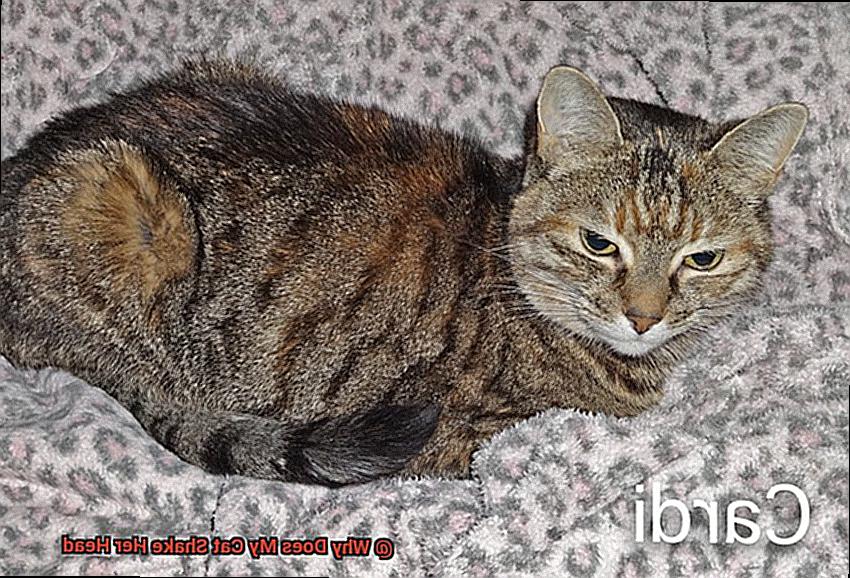As a cat owner, you’re probably familiar with the sight of your feline friend shaking their head every now and then.
It’s easy to dismiss this behavior as harmless, but did you know that it could be a sign of an underlying health issue? While occasional head shaking is normal for cats trying to get rid of pesky bugs or debris in their ears, persistent head shaking should not be ignored.
In this blog post, we’ll delve into the reasons why your cat might be shaking her head and what you can do to help. We’ll explore everything from ear infections and allergies to parasites and foreign objects that could be causing this behavior.
Plus, we’ll discuss the telltale signs that indicate whether or not your cat needs veterinary attention. So if you’ve noticed your furry companion shaking her head more frequently than usual, don’t fret.
So, let’s get started.
Common Causes of Head Shaking in Cats
So, when you notice them shaking their head frequently, it’s easy to become worried.

Head shaking in cats can be caused by a variety of factors, from simple issues like ear infections to more serious underlying health conditions. In this article, we’ll explore some of the most common causes of head shaking in cats and how to address them.
Ear infections are a top cause of head shaking in cats. These infections occur when bacteria or yeast invade the ear canal, leading to inflammation and discomfort.
Your cat may frequently shake their head in an attempt to alleviate the irritation in their ears. If you notice any signs of an ear infection, such as swelling, discharge, or a foul odor coming from your cat’s ears, it’s important to seek prompt veterinary care.
Allergies are another common culprit behind head shaking in cats. Just like humans, cats can be allergic to various substances such as pollen, dust and certain types of food.
If your cat is exposed to an allergen that triggers an allergic reaction, they may experience symptoms such as itching, sneezing, and yes—head shaking. If you suspect your cat has allergies, consult with your vet for treatment options.
Mites or fleas can also cause head shaking in cats. These tiny parasites can lead to intense itching and irritation in the ears, causing excessive scratching and head shaking.
If you notice your cat constantly scratching behind their ears or shaking their head more than usual, check for signs of mites or fleas and seek treatment right away. Lastly, tumors or growths affecting the ear or surrounding tissues can cause head shaking in cats.
If you notice any lumps or bumps around your cat’s ears or head that seem unusual, it’s essential to take them to the vet immediately for evaluation.
Ear Mites as a Cause of Head Shaking in Cats
It’s possible that they are suffering from ear mites, tiny parasites that feed on the wax and oils in your cat’s ears.
These pesky parasites can cause a range of uncomfortable symptoms, including inflammation, irritation, and infection, leading to head shaking and scratching. Fortunately, ear mites are a common problem that is easily treated by a veterinarian.
If you suspect that your cat has ear mites, it’s essential to take them to a vet as soon as possible to prevent the mites from causing more severe ear infections. Symptoms of ear mites include excessive scratching around the ears, head shaking, and a dark discharge from the ears.

You may also notice redness, swelling, or crusting around the ears or a foul odor emanating from your cat’s ears. When you take your cat to the vet, they will likely recommend a topical medication that is applied directly to the ears to kill the mites and soothe any inflammation or irritation.
It’s crucial to follow your vet’s instructions carefully and continue treatment for the recommended duration to ensure that all the mites are eliminated. In addition to treating your cat’s ears with medication, it’s important to clean their bedding and living areas regularly to prevent reinfestation.
Regularly cleaning your cat’s ears with a gentle ear cleaner can also help keep them free of wax buildup and make it easier to spot any signs of ear mites early on. Prevention is key when it comes to ear mites.
Keeping your cat indoors can help reduce their risk of coming into contact with other cats who may have ear mites. Additionally, scheduling regular checkups with your vet can help catch any potential ear problems early on and prevent them from turning into more serious issues.

Allergies as a Cause of Head Shaking in Cats
Just like humans, cats can develop allergies to a wide range of environmental and food allergens. When a cat is allergic to something, its immune system responds by producing antibodies that fight off the perceived threat.
Unfortunately, this immune response triggers the release of histamines that cause inflammation and irritation in different parts of the body, including the skin, eyes, and ears. So why does your cat shake its head during an allergic reaction?
It’s a way for them to relieve the itchiness and discomfort caused by the inflammation. Common culprits for triggering head shaking in cats include pollen, dust mites, mold spores, certain foods, flea saliva, and cleaning products.
If you suspect that your cat’s frequent head shaking is due to allergies, it’s crucial to identify and eliminate the allergen from its environment. This may involve changing your cat’s diet, using hypoallergenic cleaning products, keeping your home clean and free of dust and debris, and treating your cat for fleas and other parasites.
In some cases, allergy testing may be recommended by your vet to identify the specific allergen causing your cat’s symptoms. Once identified, your vet may recommend immunotherapy or allergy shots to help desensitize your cat’s immune system to the allergen over time.
If you notice your feline friend shaking their head frequently, don’t hesitate to take them to the vet for a proper diagnosis and treatment plan.
Neurological Issues as a Cause of Head Shaking in Cats
While allergies are a common cause, neurological issues should also be considered.
Epilepsy is a neurological condition that affects the brain’s electrical activity, causing seizures.
Along with muscle twitching and sudden collapse, cats with epilepsy may shake their heads vigorously. It’s crucial to note that not all seizures involve violent movements, and some may manifest as a brief loss of consciousness.

Another possible culprit is vestibular disease, which affects the cat’s inner ear responsible for maintaining balance and orientation. Symptoms of vestibular disease include head tilt, loss of balance, circling, and nausea.
While it can be alarming to see your cat struggle with these symptoms, most cats recover fully within a few weeks without treatment. Brain tumors are another potential cause of head shaking in cats.
These tumors can affect various parts of the brain, including the cerebellum, which controls movement and balance. Along with head shaking, cats with brain tumors may exhibit symptoms such as head pressing, seizures, and changes in behavior or personality.
If you suspect your cat may be suffering from a neurological issue, prompt veterinary care is crucial. Your vet will conduct a comprehensive physical examination and may recommend diagnostic tests such as blood work or imaging to determine the underlying cause of your cat’s symptoms.
In summary, while allergies are generally less severe than neurological problems, both require prompt attention from a veterinarian.
pvA0YhHjWKM” >

Prevention and Treatment for Cat Head Shaking
One issue that can be particularly distressing is head shaking.
This may indicate underlying health issues, such as infections or allergies, or even more serious conditions like neurological disorders or tumors. Luckily, there are steps you can take to prevent and treat cat head shaking.
Prevention is the first line of defense when it comes to cat head shaking. Regularly cleaning your cat’s ears with a vet-recommended ear cleaner is essential to prevent infections that can cause head shaking.
You should also ensure that your cat’s diet is nutritionally balanced and free from allergens that may trigger head shaking. If your cat has allergies, consult with your veterinarian for dietary recommendations.

Regular check-ups with your veterinarian are also critical in detecting any underlying health issues that may cause head shaking. Early treatment of underlying conditions such as ear infections, mites, or tumors can help reduce the frequency and severity of head shaking.
In some cases, medication may be necessary to treat head shaking. Your veterinarian may prescribe antibiotics to treat bacterial infections or corticosteroids to reduce inflammation.
However, it is important to remember that medication should only be used under the guidance of a veterinarian. In more severe cases of head shaking, surgery may be necessary to remove tumors or correct abnormalities in the ear canal.
In conclusion, taking proactive steps such as maintaining good hygiene practices, ensuring a healthy diet, scheduling regular vet check-ups, treating underlying health issues promptly, and using medication or surgery if necessary can go a long way in preventing and treating cat head shaking.
Also Read: Why Do Cats Shake Their Heads When They Eat?
Conclusion
To sum up, it’s important to be attentive to any changes in your feline friend’s behavior, particularly if she shakes her head frequently.
Although the occasional head shake is normal for cats trying to get rid of debris or bugs in their ears, persistent head shaking could indicate a more serious issue. There are several reasons why your cat may shake her head, ranging from ear infections and allergies to parasites and neurological problems.
It’s crucial to identify the underlying cause to provide appropriate treatment and prevent further complications. Prevention is the best medicine when it comes to cat head shaking.
Regular cleaning of your cat’s ears with a vet-recommended ear cleaner, ensuring a healthy diet, scheduling routine vet check-ups, and treating underlying health issues promptly can all help reduce the frequency and severity of head shaking. If you observe signs of an ear infection or suspect that your cat has allergies or neurological problems, don’t hesitate to seek prompt veterinary care.
Your veterinarian will conduct a thorough physical examination and may recommend diagnostic tests to determine the root cause of your cat’s symptoms. Remember that medication should only be used under the guidance of a veterinarian.
In more severe cases of head shaking, surgery might be required to remove tumors or correct abnormalities in the ear canal.







